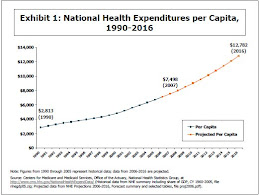Since the primary issue is whether profit is made instead of, "Are people healthy and able to obtain sufficient care if they are unhealthy?" the US health system has become extremely expensive in the past 30 years without becoming comprehensive.
Let's start with your average American: probably working a 9-5, reasonably healthy, might have kids, probably has a spouse, and definitely doesn't want to go bankrupt in the event he or she has a medical emergency, or possibly becomes suddenly UN-healthy. Because of the fear of not having enough money to pay for medical care (that falls under the right to life), as stated in our Constitution, our average American opts into the health insurance plan offered to him by his employer.
This employer, in the interest of appearing attractive to potential employees, has found a health insurance plan, and pays into it, in order to offer it to its employees. Oh, and it receives a federal tax credit while doing so. Probably though, the insurance plan isn't absolutely comprehensive, because no insurance plan is.
Now, this insurance company makes its profit by contracting with medical providers, offering them a certain rate of reimbursement for the procedures and tests they perform. Said insurance company might simply pay a flat rate to a hospital for a certain disease's treatment course, and so the hospital now has incentive to not run any extra tests that might be preventive in nature, as well as the incentive to hurry our average American out the door as soon as possible. The insurance company also provides a list of acceptable medications, among which are older generic versions of comparable drugs, so that our average American has to choose between paying $10 for older generic prescription and paying nearly $100 for the latest, Dr. recommended prescription. Average American doesn't really understand the benefit of the latest drug, and so decides on the cheaper one. Only to find out later that had he or she taken the latest, they might have been able to prevent a serious medical problem a few years later. Good thing they saved $90.
Physicians, driven also by making more money, increasing their clout in their communities, and paying off all their student loans from their very expensive education, contract with certain insurance companies - usually the ones who pay them the most per procedure. Getting paid, after all, is what delivering medical care has come to in these times. As a result, the physicians are scheduling patients far too close together to give them sufficient attention, and so our average Americans probably don't understand what is going on with their health. But, there are so many forces at work with every aspect of the medical field, that there is no other solution within the current framework.
Obviously, this is just one point of view, but personally, I feel that there is too much business in health care right now for much of this to conceivably change. The scenarios above don't even get into the other systems (Medicare, Medicaid, VA, IHS, SCHIP, etc) in the US and why they cost so much money, but suffice it to say that the basic reason we spend so much money on health care is because someone, somewhere is profiting from the necessity of medicine.
All I want to know is, why can't we all band together and change this, once and for all?

No comments:
Post a Comment